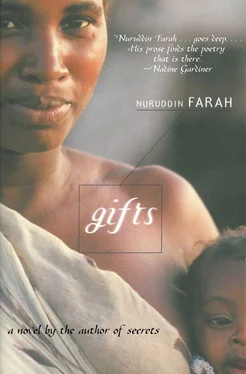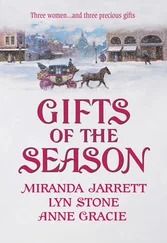Nuruddin Farah - Gifts
Здесь есть возможность читать онлайн «Nuruddin Farah - Gifts» весь текст электронной книги совершенно бесплатно (целиком полную версию без сокращений). В некоторых случаях можно слушать аудио, скачать через торрент в формате fb2 и присутствует краткое содержание. Год выпуска: 2011, Издательство: Arcade Publishing, Жанр: Современная проза, на английском языке. Описание произведения, (предисловие) а так же отзывы посетителей доступны на портале библиотеки ЛибКат.
- Название:Gifts
- Автор:
- Издательство:Arcade Publishing
- Жанр:
- Год:2011
- ISBN:нет данных
- Рейтинг книги:3 / 5. Голосов: 1
-
Избранное:Добавить в избранное
- Отзывы:
-
Ваша оценка:
- 60
- 1
- 2
- 3
- 4
- 5
Gifts: краткое содержание, описание и аннотация
Предлагаем к чтению аннотацию, описание, краткое содержание или предисловие (зависит от того, что написал сам автор книги «Gifts»). Если вы не нашли необходимую информацию о книге — напишите в комментариях, мы постараемся отыскать её.
Gifts — читать онлайн бесплатно полную книгу (весь текст) целиком
Ниже представлен текст книги, разбитый по страницам. Система сохранения места последней прочитанной страницы, позволяет с удобством читать онлайн бесплатно книгу «Gifts», без необходимости каждый раз заново искать на чём Вы остановились. Поставьте закладку, и сможете в любой момент перейти на страницу, на которой закончили чтение.
Интервал:
Закладка:
Taariq was now jittery, unable to decide which of the many strands worked into his or Duniya’s yarn he should pursue. He had an orderly mind, in which thoughts were instantly catalogued, given a subheading, ideas were divided into paragraphs as if he were writing them down in a systematic order. Working another strand into the yarn already spun, Taariq said, “Shiriye, who was at Qaasim’s today, thinks you’re mad to want to keep the foundling.”
“What was Shiriye doing there?” Duniya said suspiciously.
“He was eager to have a private word with Qaasim,” said Taariq, giving away nothing. “Maybe he wanted to make more money on the side, selling watches or buying them at a discount from Qaasim, I don’t know.”
“What reasons did Shiriye give you when he thought I was mad to keep the baby?” Duniya asked.
“Shiriye doesn’t give reasons. He spouts opinions, crude prejudices and unlearned pontifications.”
“What’s your opinion, your refined, learned opinion?” Duniya asked.
He wore that distant smile of his, like a mirage, promising water to the thirsty, and giving the traveller hope of an oasis beyond the hill. The water of Taariq’s smile finally rose muddy and grey He said, “It’s such a difficult thing to advise people on these matters. It’s like getting married, a decision best left in the hands of the two persons involved, not third, fourth or fifth parties.”
“But what would you do if you were in my position?”
“I’d have to know a lot more than I do now before making up my mind.”
“But even if you did know, the beat of your mind and the path mine walks are so different that I doubt if we would arrive at the same conclusion.”
“I could not agree with you more,” he said.
Nagging at her mind, all this time, was the unfulfilled desire to get up and find out why the foundling had not stirred or cried for so long. But a voice whispered in her ear, assuring her that all was well with the baby, there was nothing to worry her.
“Tell me how you see it,” she said.
“I wouldn’t give him to Muraayo, for instance.”
“Why not?”
“Muraayo — and mind you I am very fond of her — has little in-depth understanding of symbols. What she does is to live on the surface of things, in the glitter of false beauties, easily contented with the superficiality of things. A baby like this foundling requires parents who will treat him as if he were of special standing, not reminded of his earthy beginnings, or God forbid, that his ancestry is unknown. Imagine if Jesus were jeered at by his peers, scornfully telling him that he did not have a father like them. The strength of the Jesus myth is that we are not told much. In the case of Moses, we first see him a floating foundling, in an ark, sucking his thumb. Then we meet him as an adult, God’s messenger. We don’t see mythical babies growing up, because it deprives them of that magical credibility that is the essence of all myths. So to remain faithful to the incredible task before him, this foundling has to grow up in an environment away from the likes of Muraayo and Qaasim, grow up in an incubated area of the world, unexposed to the day-to-day realities which surround most of us.”
“Suppose we believe that he has known parents?”
“It doesn’t mean much.”
“How is that?”
“Jesus had a known parent,” Taariq said, “his mother, so did Moses, or the African Sunjata or Mwindo — all these mythical children had known mothers. Maybe they were half-gods, half-human.”
“What if he dies young, say, even tomorrow, or ten years from now, or if something incurable kills him or if tetanus claims his life? Will all this talk about myths have been mere babble, mere words, no more?” she said.
“He’ll have assumed a different kind of motif in our story; everybody will get something different out of him.” He paused. “At worst, hell have served to make some of us think seriously.”
“What if Qaasim comes asking for him?”
It was amusing to see him hesitate, like a wary Huda afraid to stumble on the consonants of her discomfort. For this was closer to home, this was not a Judaic, Christian, Islamic or Mendink myth, this was more real, touching on fraternal realities and truths, on the relationship between elder and younger brother. And Taariq knew it, and he knew that Duniya knew it too. He was frank in his opinion.
“Qaasim doesn’t know the value of gifts. I’ve known him to give away some things even before taking possession of them himself.”
“Tell me why I should keep him.”
“Because you are most worthy of him.”
“In what way?”
He wore his far-away smile and Duniya knew what that meant. None the less, she listened to him respectfully. “I don’t wish to sound religious,” he said, “but I’m increasingly beginning to think that humankind must have faith in abstractions, and on this foundation we must reconstruct the world as we know it from the myth we have faith in, but not know, really know. There’s sustenance in myth, of an enriching kind.”
Duniya did not understand what he was talking about, but thought it unnecessary to ask him to explain. The light in his eyes dimmed, like the blue of a pilot-light of a gas-cooker going out because the gas-bottle it had been feeding on has run out. Had a sudden feeling of exhaustion descended on him? Could it be part of the withdrawal syndrome, unpleasant reactions to the absence of nicotine and alcohol at the same time? She changed the subject with considerable haste.
“I enjoyed reading your ‘Story of a Cow,’” she said.
He searched for words with the clumsiness of a man with very fat fingers trying to undo a subtle knot. He did not manage to speak a full sentence she could follow. His eyes narrowed to a slit.
Duniya was sure he was asleep, and she let him. She remembered the number of times he had come home, devastated. Or when she had returned from work to find him all over the floor and beds in the shapeless position drowsiness had called on him and her three children. She would take them to their respective places of sleep.
Now Duniya was certain she heard vague noises. Because she had her back to the door, she turned to see who it was that had come and decided to leave. Not meaning to, she kicked Taariq awake, and, startled, he cried something that sounded like “Who?”
The voice of an equally worried woman answered, “It is I.”
“Please come back,” said Duniya, recognizing the old woman’s voice.
In the meantime, Taariq sat up, eyes bloodshot, rubbing them sore and redder. She apologized for waking him; he, for napping.
And Duniya got up to welcome Maryam, Marilyn’s grandmother, with the words, “The children have all gone with Bosaaso and they have left me in charge today.” Then she introduced Taariq.
It was weird, but the old woman would not look at Taariq, who had risen to shake hands with her. Looking intently at Duniya, she said, “I am sorry to drop in on you like this, but I was actually looking for Marilyn, hoping I would find her here.”
“No, I am afraid she is not here.”
“Did she go out with your children?”
“I doubt it.”
She turned round and said to Duniya, “I must be on my way then.”
At which point, Taariq said to her back, “Have we not met, you and I?”
A smile dirtied the old woman’s clean features. “Have we?” she asked.
“You gave me a blanket one early morning, and kept vigil so that my drunken figure would not be pestered by stray dogs, hungry cats and midnight thieves, for which I’ve never thanked you.”
Marilyn’s grandmother shook her head, “I don’t recall any of that.”
“I have kept the blanket as a souvenir of your kindness.”
Читать дальшеИнтервал:
Закладка:
Похожие книги на «Gifts»
Представляем Вашему вниманию похожие книги на «Gifts» списком для выбора. Мы отобрали схожую по названию и смыслу литературу в надежде предоставить читателям больше вариантов отыскать новые, интересные, ещё непрочитанные произведения.
Обсуждение, отзывы о книге «Gifts» и просто собственные мнения читателей. Оставьте ваши комментарии, напишите, что Вы думаете о произведении, его смысле или главных героях. Укажите что конкретно понравилось, а что нет, и почему Вы так считаете.











